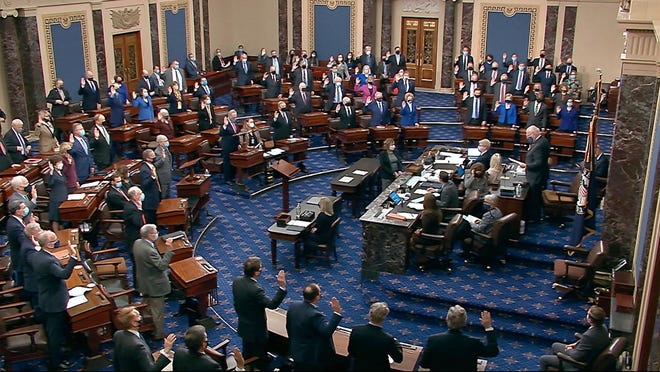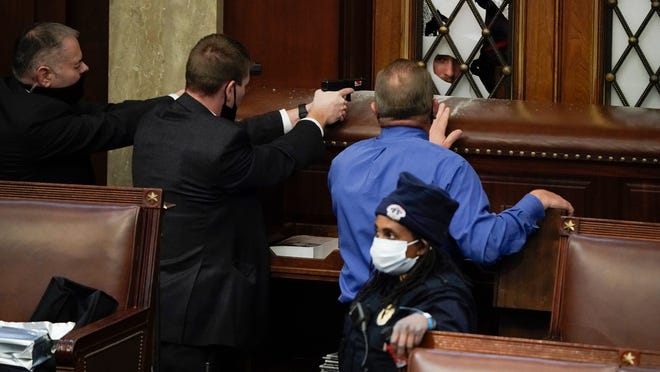[ad_1]
WASHINGTON – Former President Donald Trump’s legal team are expected to use an argument at his impeachment trial next week that is already supported by the majority of Senate Republicans in charge of his fate: That the trial is unconstitutional because Trump is no longer the commander in chief.
But still unclear is whether they’ve entirely jettisoned Trump’s allegations of election fraud, an issue that led to a rift with Trump’s prior legal team.
Trump and his first set of lawyers parted ways over trial strategy over the weekend. The former president wanted to emphasize “voter fraud” issues during the trial, said a person familiar with the legal discussions. But the original attorneys wanted to stress that the Senate should not hold a trial of a former officeholder, and that Trump’s comments during a Jan. 6 rally did not incite the mob that led a deadly riot at the U.S. Capitol.
While Trump’s new team says fraud isn’t at the center of their arguments, they’re not closing the door on them.
Trump announced Sunday evening that David Schoen, a criminal defense attorney who works in Alabama and New York, and Bruce Castor Jr., a former district attorney in Pennsylvania, would lead his defense.
Schoen, in an interview with The Washington Post Sunday evening, offered some insight on the path forward, saying he planned to focus on the “weaponization of the impeachment process” and would not argue the president’s claims of voter fraud.
“I am not a person who will put forward a theory of election fraud,” Schoen told the Post. “That’s not what this impeachment trial is about.”
Trump political adviser Jason Miller said “the focus will be on the Democrats’ unconstitutional push to remove a President who is no longer in office.”
More:Trump parts ways with impeachment lawyers as Senate trial nears
More:Risky business: Donald Trump isn’t alone in seeing his political fate tied to his impeachment trial
Miller disputed reporting that Trump parted ways with his first set of attorneys because he wanted them to relitigate hisbaseless concerns of voter fraud.
When asked how much of a role Trump’s election fraud claims might play in the impeachment trial, he said, “Our upcoming legal briefs will give a clearer and more comprehensive overview.”
Trump, who has been banned from most social media platforms, has remained virtually silent on the impeachment case that charged him with inciting an insurrection at the Capitol, which left multiple people dead. And largely so have the lawyers Trump has brought on to defend him over the weeks.
The new team appears to have a two-pronged strategy: Arguing the trial is unconstitutional and that Trump’s remarks about the election did not incite the deadly riot at the Capitol.
Backstory:We investigated claims of voter fraud in the election. Here’s what we found.
By the numbers:President Donald Trump’s failed efforts to overturn the election
House Democrats are expected to recite the history of Trump’s months of arguments questioning the legitimacy of the election, his call urging Georgia Secretary of State Brad Raffensperger to “find” votes to overturn the election of President Joe Biden and quotations from his speech Jan. 6 to the mob that later stormed the Capitol.
Trump is due on Tuesday to issue an official answer to the House’s impeachment article charging him with inciting an insurrection, a filing that could offer some insight into the former president’s defense strategy when the trial starts Feb. 9.
If Trump’s team argues the trial is unconstitutional, it would likely find a supportive group of Senate Republicans. Last week, 45 Republican senators voted against holding the trial on constitutional grounds, well more than enough votes for Trump to win an easy acquittal.
More:As Trump impeachment trial begins, he lacks star lawyers, full Republican backing
More:The second Trump impeachment trial is set for February. What happens next?
The impeachment case will mark a big test for both lawyers, who aren’t strangers to controversial disputes or representing high-profile figures but have never argued a case with such historical implications.
Castor drew headlines after he declined to prosecute comedian and actor Bill Cosby in 2005 on sexual assault allegations that years later sent Cosby to prison. He faced more scrutiny after telling a judge in Cosby’s case that he entered a secretive agreement to not file charges against the actor if he did not plead the 5th Amendment in a civil case from one of his accusers, according to The Philadelphia Inquirer.
Schoen represented Roger Stone, a key Trump ally who was convicted in connection with the investigation into Russian meddling in the 2016 election. Trump later commuted Stone’s sentence.
Schoen also met with disgraced businessman Jeffrey Epstein days before his death in 2019 to discuss taking the lead role on his defense team. Schoen told the Atlanta Jewish Times he agreed to take the role representing Epstein against allegations the financial mogul sexually exploited and abused dozens of girls.
He’s worked on voting issues and consulted the counsel for Al Gore during his election battle in the 2000 election.
The attorneys originally tapped to defend the Trump who split from the team include South Carolina lawyers Butch Bowers, Deborah Barbier, Greg Harris and Johnny Gasser, along with North Carolina lawyer Josh Howard.
Changing legal teams this close to trial “would normally be incredibly problematic,” said Ross Garber, an adjunct professor at Tulane Law School in New Orleans and an impeachment law expert. But a Senate vote last week showing little interest by Republicans in convicting Trump means the former president might not have to do much to be acquitted.
“At this point, conviction seems highly improbable,†Garber said. “Nevertheless, there could be curveballs that change the calculus. If that happens, Trump could be caught flat-footed. Also, the Senate and impeachment are new arenas for his new lawyers. It is not the traditional courtroom they are accustomed to, and the learning curve may be steep.â€
Contributing:Â Deborah Barfield Berry
[ad_2]








